Project Core kicks off co-creation in Tanzania and India
Our team has now wrapped up work on the Discover and Understand phases of Core and an exciting new chapter of the project is underway. In Tanzania and India, our teams have entered the Co-Create stage of the human-centered design (HCD) approach employed by Core. Co-creation is a collaborative creative process where we work together with our regional partners as well as local women and girls to find potential solutions to serve the sexual and reproductive health (SRH) needs of their communities.
Research undertaken during Discover was split into two stages.With thorough analysis of the data collected during our Understand stage, we have deepened our knowledge around the events, such as marriage, which shape girls’ lives and how these events impact their aspirations and goals. We have gained better insight into the psychological and behavioural traits associated with both good and negative health practices and learned what services and support systems are currently available to adolescent girls and young women.
The synthesis of all that we have learned together during the design research phases sowed certain seeds (early solution ideas). With exploration, some of these seeds have begun to stand out from the rest and excite us. The seeds have formed the basis for discussions in our early co-creation sessions and the most promising ideas, which are most inspiring to both our designers and our partners, are becoming clear.
Core?
Core is a pioneering three-year project (2018–2020) aiming to better understand, equip, and empower women to lead healthier sexual and reproductive lives. Moving beyond vertically-driven thinking about care-provision, Core charts a way forward to better respond to dynamic sexual and reproductive healthcare-seeking behaviours among women in India, Kenya, Nigeria, and Tanzania. It combines human-centered design and interdisciplinary approaches to co-create new solutions for women’s sexual and reproductive health and wellbeing.
Back to news
